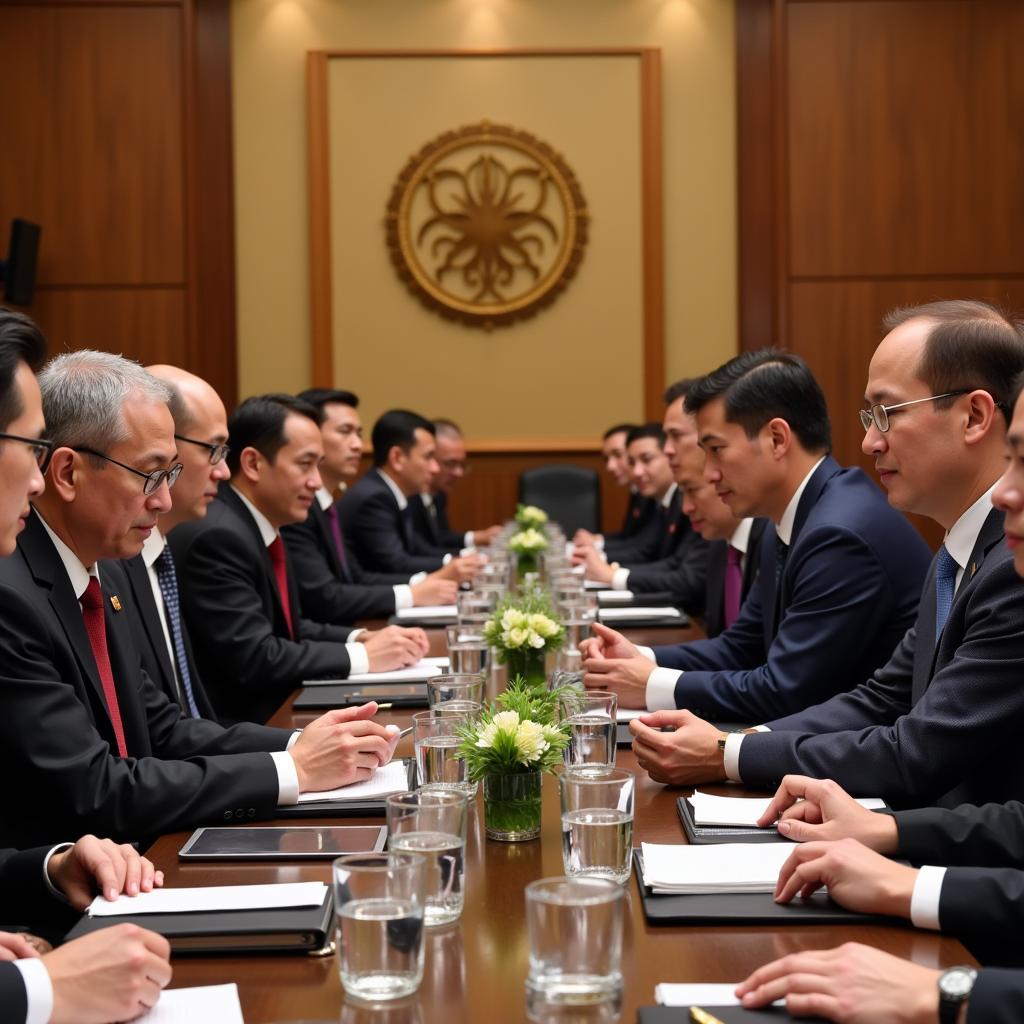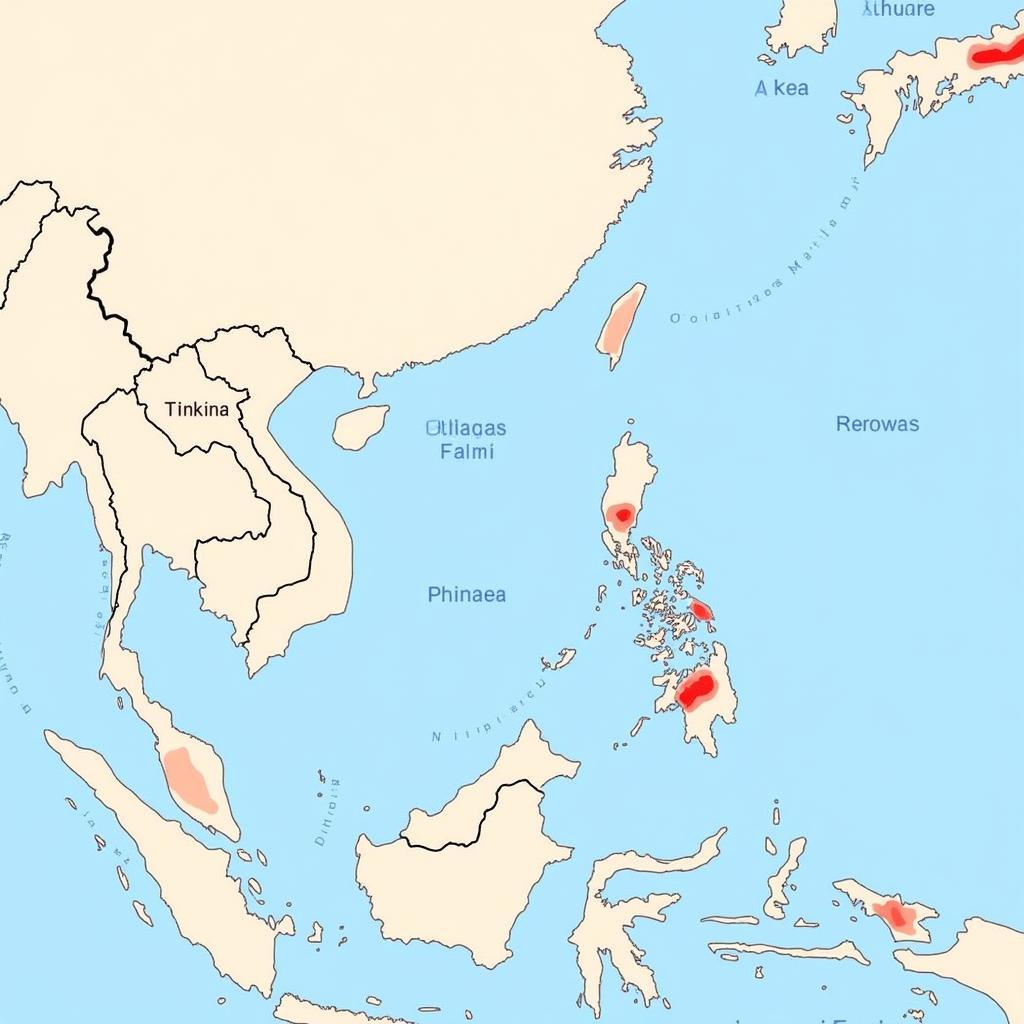Asean Australia Issues encompass a wide range of political, economic, and security challenges that shape the dynamics between the Association of Southeast Asian Nations (ASEAN) and Australia. This multifaceted relationship, marked by both cooperation and tension, is crucial for regional stability and prosperity.
Historical Context and Evolving Dynamics
Australia’s engagement with Southeast Asia dates back decades, initially driven by security concerns during the Cold War era. The formation of ASEAN in 1967 marked a turning point, providing a platform for regional cooperation and dialogue. Over the years, Australia has actively sought to strengthen ties with ASEAN, recognizing the bloc’s growing economic and geopolitical significance.
 ASEAN-Australia Ministerial Meeting
ASEAN-Australia Ministerial Meeting
Economic Cooperation and Trade Relations
Economic ties form a cornerstone of the ASEAN-Australia relationship. Australia is a significant trading partner for ASEAN, with two-way trade encompassing a diverse range of goods and services. Key sectors include resources and energy, agriculture, education, and tourism. Both sides have implemented free trade agreements to foster economic integration and facilitate business partnerships.
However, trade imbalances and non-tariff barriers remain points of contention. ASEAN countries have expressed concerns over Australia’s agricultural subsidies and strict quarantine measures, which they argue hinder market access for their products. Addressing these trade-related issues is crucial for unlocking the full potential of economic cooperation.
Security Challenges and Regional Stability
Security cooperation is another vital aspect of ASEAN-Australia relations. Both share common concerns about transnational threats such as terrorism, maritime security, and cybercrime. Australia actively participates in regional security forums led by ASEAN, including the ASEAN Regional Forum (ARF) and the East Asia Summit (EAS).
The South China Sea dispute presents a significant challenge to regional stability. While Australia maintains it does not take sides in the dispute, it has consistently advocated for freedom of navigation and a rules-based order in the region. This stance has, at times, led to tensions with China, which claims sovereignty over most of the South China Sea.
 South China Sea Territorial Claims
South China Sea Territorial Claims
Political and Diplomatic Engagement
Australia engages with ASEAN through various diplomatic channels, including regular summits, ministerial meetings, and dialogues. It also provides development assistance to ASEAN member states, focusing on areas such as education, health, and governance.
However, there have been instances where political differences have strained relations. Issues such as human rights, democracy, and governance have led to disagreements and tensions. Australia’s close alliance with the United States is also perceived by some ASEAN members as a potential source of friction, particularly in the context of US-China rivalry.
Looking Ahead: Opportunities and Challenges
The ASEAN-Australia relationship is poised at a critical juncture, facing both opportunities and challenges. Strengthening economic ties, deepening security cooperation, and navigating geopolitical complexities will be key priorities in the years to come.
Opportunities:
- Expanding Trade and Investment: There is immense potential to boost trade and investment flows between ASEAN and Australia, particularly in sectors such as infrastructure, technology, and renewable energy.
- Enhancing Connectivity: Improved infrastructure and digital connectivity can facilitate trade, tourism, and people-to-people exchanges.
- Strengthening Security Cooperation: Collaboration on counterterrorism, cybersecurity, and maritime security is crucial for addressing shared threats.
Challenges:
- Managing Geopolitical Tensions: The US-China rivalry and the South China Sea dispute will continue to test ASEAN-Australia relations.
- Addressing Trade Barriers: Removing non-tariff barriers and resolving trade disputes is essential for maximizing economic benefits.
- Bridging Development Gaps: Addressing development disparities within ASEAN is crucial for fostering inclusive regional growth.
Conclusion: Forging a More Resilient Partnership
The ASEAN-Australia relationship is complex and multifaceted, characterized by both cooperation and competition. Addressing challenges and seizing opportunities will require sustained dialogue, mutual understanding, and a commitment to shared goals. By working together, ASEAN and Australia can forge a more resilient and mutually beneficial partnership that contributes to regional peace, stability, and prosperity.
FAQs about ASEAN Australia Issues:
1. What is the significance of the ASEAN-Australia relationship?
The ASEAN-Australia relationship is crucial for regional stability, economic prosperity, and security cooperation. Both share common interests in promoting a rules-based order, addressing transnational threats, and fostering inclusive development.
2. What are some of the key challenges in the relationship?
Key challenges include managing geopolitical tensions stemming from the US-China rivalry and the South China Sea dispute, addressing trade barriers that hinder economic cooperation, and bridging development gaps within ASEAN.
3. How can ASEAN and Australia strengthen their partnership?
Strengthening the partnership requires expanding trade and investment, enhancing connectivity, deepening security cooperation, and fostering greater people-to-people exchanges.
 ASEAN-Australia Partnership for the Future
ASEAN-Australia Partnership for the Future
4. What is Australia’s role in ASEAN-led forums?
Australia is an active participant in ASEAN-led forums such as the ASEAN Regional Forum (ARF) and the East Asia Summit (EAS), contributing to regional dialogue and cooperation on security and political issues.
5. How does the South China Sea dispute affect ASEAN-Australia relations?
The South China Sea dispute presents a challenge as Australia advocates for freedom of navigation and a rules-based order, which can sometimes lead to tensions with China’s assertive stance in the region.
Need More Information?
Explore these related articles on our website for further insights:
Still have questions about ASEAN Australia issues?
Contact us at 0369020373, email us at [email protected], or visit us at Thôn Ngọc Liễn, Hiệp Hòa, Bắc Giang, Việt Nam. Our dedicated team is available 24/7 to assist you.


